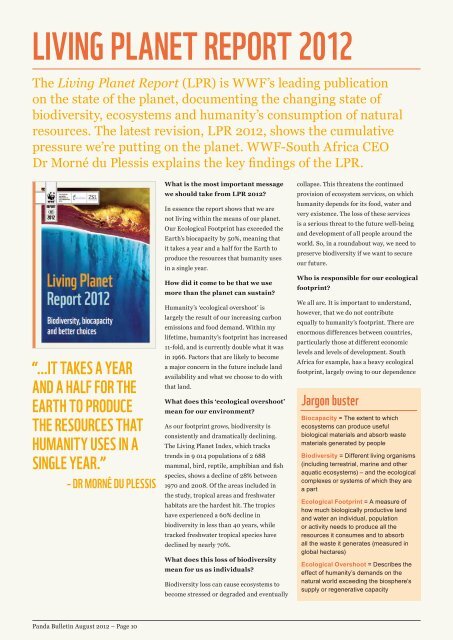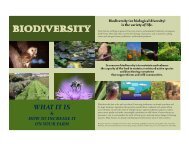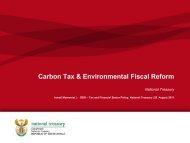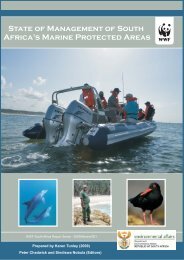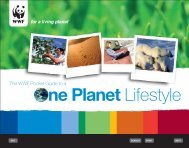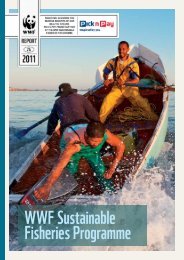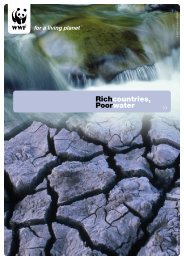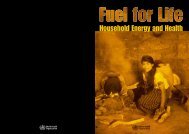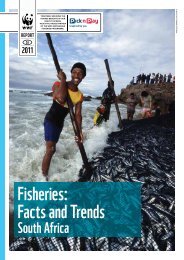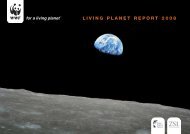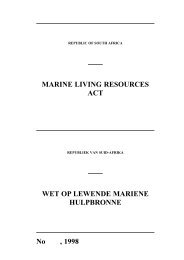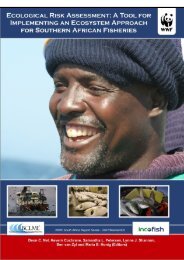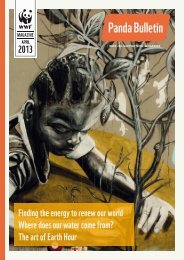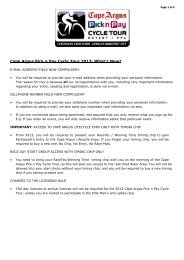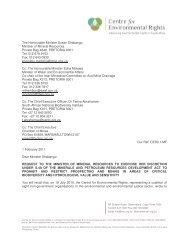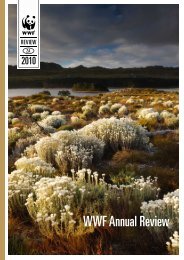Living Planet Report - WWF South Africa
Living Planet Report - WWF South Africa
Living Planet Report - WWF South Africa
You also want an ePaper? Increase the reach of your titles
YUMPU automatically turns print PDFs into web optimized ePapers that Google loves.
LIvING PLANET REPORT 2012<br />
The <strong>Living</strong> <strong>Planet</strong> <strong>Report</strong> (LPR) is <strong>WWF</strong>’s leading publication<br />
on the state of the planet, documenting the changing state of<br />
biodiversity, ecosystems and humanity’s consumption of natural<br />
resources. The latest revision, LPR 2012, shows the cumulative<br />
pressure we’re putting on the planet. <strong>WWF</strong>-<strong>South</strong> <strong>Africa</strong> CEO<br />
Dr Morné du Plessis explains the key findings of the LPR.<br />
“…IT TAkES A YEAR<br />
AND A hALF FOR ThE<br />
EARTh TO PRODUCE<br />
ThE RESOURCES ThAT<br />
hUMANITY USES IN A<br />
SINGLE YEAR.”<br />
– DR MORNé DU PLESSIS<br />
Panda Bulletin August 2012 – Page 10<br />
What is the most important message<br />
we should take from LPR 2012?<br />
In essence the report shows that we are<br />
not living within the means of our planet.<br />
Our Ecological Footprint has exceeded the<br />
Earth’s biocapacity by 50%, meaning that<br />
it takes a year and a half for the Earth to<br />
produce the resources that humanity uses<br />
in a single year.<br />
how did it come to be that we use<br />
more than the planet can sustain?<br />
Humanity’s ‘ecological overshoot’ is<br />
largely the result of our increasing carbon<br />
emissions and food demand. Within my<br />
lifetime, humanity’s footprint has increased<br />
11-fold, and is currently double what it was<br />
in 1966. Factors that are likely to become<br />
a major concern in the future include land<br />
availability and what we choose to do with<br />
that land.<br />
What does this ‘ecological overshoot’<br />
mean for our environment?<br />
As our footprint grows, biodiversity is<br />
consistently and dramatically declining.<br />
The <strong>Living</strong> <strong>Planet</strong> Index, which tracks<br />
trends in 9 014 populations of 2 688<br />
mammal, bird, reptile, amphibian and fish<br />
species, shows a decline of 28% between<br />
1970 and 2008. Of the areas included in<br />
the study, tropical areas and freshwater<br />
habitats are the hardest hit. The tropics<br />
have experienced a 60% decline in<br />
biodiversity in less than 40 years, while<br />
tracked freshwater tropical species have<br />
declined by nearly 70%.<br />
What does this loss of biodiversity<br />
mean for us as individuals?<br />
Biodiversity loss can cause ecosystems to<br />
become stressed or degraded and eventually<br />
collapse. This threatens the continued<br />
provision of ecosystem services, on which<br />
humanity depends for its food, water and<br />
very existence. The loss of these services<br />
is a serious threat to the future well-being<br />
and development of all people around the<br />
world. So, in a roundabout way, we need to<br />
preserve biodiversity if we want to secure<br />
our future.<br />
Who is responsible for our ecological<br />
footprint?<br />
We all are. It is important to understand,<br />
however, that we do not contribute<br />
equally to humanity’s footprint. There are<br />
enormous differences between countries,<br />
particularly those at different economic<br />
levels and levels of development. <strong>South</strong><br />
<strong>Africa</strong> for example, has a heavy ecological<br />
footprint, largely owing to our dependence<br />
Jargon buster<br />
biocapacity = The extent to which<br />
ecosystems can produce useful<br />
biological materials and absorb waste<br />
materials generated by people<br />
biodiversity = Different living organisms<br />
(including terrestrial, marine and other<br />
aquatic ecosystems) – and the ecological<br />
complexes or systems of which they are<br />
a part<br />
ecological Footprint = A measure of<br />
how much biologically productive land<br />
and water an individual, population<br />
or activity needs to produce all the<br />
resources it consumes and to absorb<br />
all the waste it generates (measured in<br />
global hectares)<br />
ecological overshoot = Describes the<br />
effect of humanity’s demands on the<br />
natural world exceeding the biosphere’s<br />
supply or regenerative capacity


